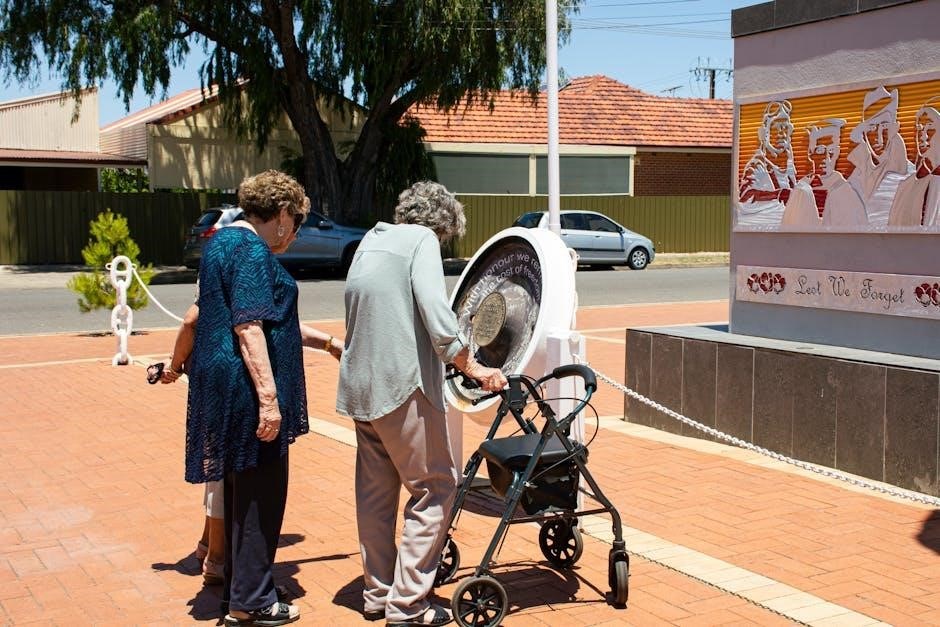Women’s History Month celebrates women’s contributions through diverse activities, fostering awareness and empowerment․ It honors achievements, promotes equality, and inspires future generations with educational and cultural events․
1․1 Overview of Women’s History Month
Women’s History Month, celebrated annually in March, honors the achievements and contributions of women throughout history․ It emphasizes the importance of gender equality and highlights the progress made toward women’s empowerment․ The month-long celebration includes educational programs, cultural events, and tributes to influential women who have shaped society․ By recognizing their legacies, Women’s History Month inspires future generations to continue advancing women’s rights and opportunities․
1․2 Importance of Celebrating Women’s Contributions
Celebrating women’s contributions fosters pride, motivation, and a deeper understanding of their roles in shaping society․ It highlights achievements in various fields, from science to arts, and promotes gender equality․ Recognizing women’s impact inspires future generations to pursue their goals and strive for excellence․ This celebration also unites communities, encouraging dialogue and collaboration to address ongoing challenges․ By honoring women’s contributions, we pave the way for a more inclusive and equitable world․
Educational Activities for Women’s History Month
Educational activities include workshops, lessons, and discussions on women’s history, empowering students to understand and appreciate women’s roles in shaping society and culture․
2․1 Workshops on Women’s Rights and Empowerment
Workshops on women’s rights and empowerment focus on addressing gender equality, workplace inequality, and leadership development․ These sessions often feature panel discussions, interactive exercises, and resources to inspire action․ Organizations like the Women’s Forum of North Carolina highlight key issues, such as the findings from “The State of Working Women 2023” report, to educate participants․ These workshops aim to equip women with tools for advocacy, fostering a supportive environment for dialogue and growth․ They play a crucial role in promoting equity and celebrating women’s achievements during Women’s History Month․
2․2 Lesson Plans for Teaching Women’s History
Lesson plans for teaching women’s history are designed to educate students about the contributions and challenges faced by women․ These plans often include interactive activities, such as discussions on trailblazers like Nelly Korda and Charley Hull, and analyses of historical milestones․ Resources like the “State of Working Women 2023” report provide real-world context for understanding workplace inequality․ By incorporating storytelling and cultural insights, these lessons aim to inspire students and promote a deeper appreciation for women’s achievements and ongoing struggles for equality․
Community Events and Celebrations
Community events celebrate women’s achievements with parades, festivals, and cultural activities․ These gatherings honor influential women, promote equality, and foster connections among participants worldwide․
3․1 Organizing Women’s History Month Parades
Organizing Women’s History Month parades involves meticulous planning to celebrate women’s achievements․ These events showcase themes of equality, empowerment, and unity․ Participants include women leaders, community groups, and local organizations․ The parades feature floats, banners, and performances that highlight influential women’s contributions․ Such events foster inspiration and a sense of community, honoring the progress made and encouraging future generations to strive for gender equality․
3․2 Hosting Women’s History Month Festivals
Hosting Women’s History Month festivals is a vibrant way to celebrate women’s contributions․ These events often feature live music, art exhibitions, and food from diverse cultures․ Festivals include interactive workshops, panel discussions, and keynote speeches by influential women․ They provide a platform to showcase women’s achievements in various fields, fostering community engagement and cultural exchange․ such festivals also offer family-friendly activities, ensuring all ages can participate and learn about women’s history․ The goal is to inspire and educate while honoring the legacy of women who have shaped society․

Cultural and Artistic Activities
Cultural and artistic activities celebrate women’s history through art exhibitions, film screenings, and performances․ These events highlight women’s contributions to creativity, fostering appreciation and inspiration globally․
4․1 Women’s History Month Art Exhibitions
Women’s History Month art exhibitions showcase works by female artists, celebrating their creativity and contributions․ These events feature paintings, sculptures, and multimedia installations that highlight women’s experiences and achievements․ Exhibitions often include historical pieces, contemporary works, and interactive displays, providing a platform for storytelling and cultural exchange․ They aim to inspire dialogue about gender equality and empower future generations by honoring women’s artistic legacies․ Many exhibitions are hosted in galleries, museums, and public spaces, making art accessible to diverse audiences․

4․2 Film Screenings on Women’s History
Film screenings during Women’s History Month highlight women’s stories, achievements, and struggles through documentaries, biographies, and fictional narratives․ These events showcase trailblazers like Rosa Parks, Frida Kahlo, and modern leaders, inspiring audiences with their resilience and innovation․ Discussions often follow screenings, fostering dialogue on gender equality and empowerment․ By sharing these stories, films educate, motivate, and celebrate women’s contributions, promoting a deeper understanding of their roles in shaping history and culture․
Tributes to Influential Women
Tributes honor women who have shaped history and inspire future generations․ Celebrations include exhibitions, media spotlights, and community recognition of their achievements and lasting legacies․
5․1 Recognizing Pioneers in Women’s History
Recognizing pioneers in women’s history involves celebrating trailblazers who broke barriers and inspired change․ These women, such as suffragists, civil rights activists, and STEM trailblazers, paved the way for future generations․ Their achievements are highlighted through biographies, documentaries, and public events during Women’s History Month․ Schools and organizations often feature their stories to educate and empower others․ Honoring these pioneers ensures their legacies endure, motivating individuals to continue advancing gender equality and women’s empowerment․ Their contributions remain a cornerstone of progress and inspiration worldwide․
5․2 Honoring Modern-Day Women Leaders
Honoring modern-day women leaders involves celebrating their impactful contributions to society, professions, and communities․ Through events, awards, and media features, their achievements are spotlighted to inspire others․ Workshops, festivals, and advocacy campaigns often include tributes to contemporary trailblazers, fostering a culture of appreciation and equality․ Recognizing these leaders motivates future generations to pursue leadership roles and strive for excellence, ensuring their legacies continue to drive progress and empower women globally․ Their stories serve as powerful reminders of the importance of gender equality and leadership in today’s world․

Advocacy and Awareness Campaigns
Advocacy and awareness campaigns during Women’s History Month focus on promoting gender equality and addressing women’s issues through educational efforts and community engagement, inspiring action and support for women’s empowerment․
6․1 Promoting Gender Equality Initiatives
Promoting gender equality is a cornerstone of Women’s History Month, emphasizing the importance of equal opportunities and rights for women․ Organizations like the Women’s Forum of North Carolina and UN Women champion initiatives that empower women in leadership, education, and the workplace․ These efforts address systemic inequalities, advocate for policy changes, and inspire collective action․ By highlighting success stories and fostering dialogue, gender equality campaigns during this month aim to create a more inclusive and equitable society for future generations․
6․2 Raising Awareness About Women’s Issues
Raising awareness about women’s issues is a key focus during Women’s History Month, highlighting challenges such as workplace inequality, healthcare access, and gender-based discrimination․ Organizations like the Women’s Forum of North Carolina and UN Women lead initiatives to educate communities through workshops, panel discussions, and social media campaigns․ These efforts aim to amplify women’s voices, address systemic barriers, and foster understanding and support․ By shedding light on these issues, the month inspires collective action toward creating a more equitable society for all․

Family-Friendly Activities
Engage families with storytelling sessions, crafts, and educational games celebrating women’s achievements․ These activities inspire kids to learn about women’s roles in history and society․
7․1 Women’s History Month Crafts for Kids
Engage children with creative crafts celebrating women’s history, such as making timelines of influential women, crafting inspirational cards, or designing DIY outfits from recycled materials․ These activities foster creativity and provide an opportunity to teach kids about women’s contributions while having fun․ Families can also create art projects highlighting women’s achievements, encouraging kids to explore history through hands-on learning․ These crafts are both educational and entertaining, making them a great way to involve children in Women’s History Month celebrations․
7․2 Storytelling Sessions About Women’s Achievements
Storytelling sessions about women’s achievements are a powerful way to educate and inspire, especially for children․ These sessions highlight the lives of influential women, their challenges, and successes․ Families can gather to share stories of historical figures like Rosa Parks or modern leaders, fostering admiration for their resilience․ Interactive elements, such as Q&A or role-playing, can deepen understanding․ This activity not only preserves history but also encourages kids to emulate the courage and determination of these remarkable women, creating a lasting impact on their perspective and aspirations․

Digital Resources and Guides
Digital resources and guides provide accessible tools for learning about Women’s History Month․ Downloadable PDFs and online platforms offer educational materials, activities, and interactive content for all ages․
8․1 Downloadable PDF Guides for Women’s History Month
Downloadable PDF guides for Women’s History Month offer a wealth of educational materials and activities․ These resources include lesson plans, activity sheets, and historical timelines, providing engaging content for educators, parents, and students․ They highlight influential women, their achievements, and their impact on society․ The guides are designed to be accessible and user-friendly, making it easy to incorporate Women’s History Month into classrooms and home learning environments․ They serve as valuable tools for fostering awareness, understanding, and inspiration throughout the month and beyond․
8․2 Online Platforms for Women’s History Education
Online platforms provide a variety of resources for Women’s History Month, offering interactive content and educational tools․ Websites like the Women’s History Month website and educational portals feature historical timelines, biographies of influential women, and lesson plans tailored for different age groups․ These platforms also include quizzes, videos, and downloadable materials, making learning engaging and accessible․ They serve as invaluable tools for educators and learners, fostering a deeper understanding of women’s contributions to history and society․
Celebrate women’s achievements year-round by supporting empowerment initiatives and engaging in educational activities․ Download PDF guides for inspiration and join future events to champion gender equality and women’s progress․
9․1 Encouraging Ongoing Support for Women’s Empowerment
Continuous support for women’s empowerment is essential beyond Women’s History Month․ Engage with educational resources, advocate for gender equality, and participate in initiatives that uplift women․ Utilize PDF guides and online platforms to stay informed and involved․ Celebrate women’s achievements year-round by promoting inclusivity and equality in daily life․ Encourage others to join in fostering a supportive environment for women’s growth and leadership․ Together, we can create lasting impact and ensure women’s contributions are valued every day․
9․2 Getting Involved in Future Women’s History Month Activities
Engage in future Women’s History Month activities by volunteering, attending events, or organizing initiatives․ Explore educational resources, workshops, and festivals that celebrate women’s achievements․ Participate in advocacy campaigns, art exhibitions, and storytelling sessions to inspire others․ Collaborate with communities, schools, and organizations to create impactful programs․ Download PDF guides for planning and stay connected through online platforms․ Every contribution amplifies the celebration of women’s history and fosters a culture of equality and empowerment year-round․